Kopernio, Lean Library, Anywhere Access & other "Access Broker" browser extensions - a roundup & update of current state of play

It has been over a year in April 2018 since I had the opportunity to present at two panels in conferences alongside experts such as Lisa Hinchliffe, Johan Tilstra (Founder Lean Library), Jason Priem (Cofounder Unpaywall), Ben Kaube (Cofounder Kopernio) on the topic of browser extensions that help users gain quick access to the full text of articles while browsing the web.
They would typically be installed as a browser extension in the user's web browser, and would activate when they detected the user was on a page with article details and would typically popup a message with a link to where the article full text was available or offer to download the PDF directly for the user.
These browser extensions can be divided into two main categories. Early on many of these extensions such as Unpaywall and Open Access Button focused only on discovery of free to read text only
We eventually started to see the rise of browser extensions (many of which were commerical) such as Kopernio and Lean Library, that extended the idea to finding copies available via institutional subscriptions.
Such extensions aimed to help users conveniently get one-click access to the best verson of the article available to them. This could be very helpful if you didn't start off your search from a library discovery service or page and was off campus.
Since then, there have been quite a few developments in this area. First off usage of such extensions has started to take off.
While number of installs via the Chrome Webstore is a very crude measure of adoption rate (better would be some measure of " monthly active user") , it's the best I have currently.
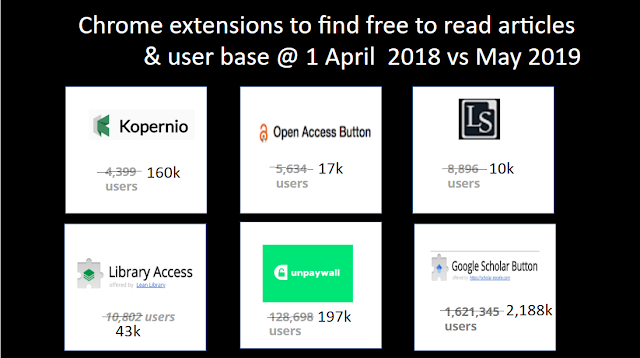
As you can see above there has been quite dramatic increase in number of installs of many of the browser extensions I was tracking from April 2018 to May 2019, particularly for Kopernio and Library Access (Lean Library). Concidentally both were acquired during this period by Clarivate and Sage respectively.
There were relatively more modest increases by Open Access Button, Unpaywall (both find only free to read material and not papers available via institutional access) as well as Lazy Scholar (a personal hobby project by Colby Vorland).
Google Scholar button - an official extension by Google which also helps with detection of free and instiutional access versions still remains in the lead at 2.2 million, more than all the rest combined.
I consider the free Google Scholar button an excellent no frills free extension that does the job and should be considered as a baseline for comparison. (The free Lazy Scholar might be also be worth considering). What value do commerical browser extensions add?
Developments and moves by players in the area
Just days before my panel in April 2018, it was announced Clarivate acquired Kopernio.
On June 2018, Digital Science announced Anywhere Access, which among other things "delivers simple 1-click access to the full-text PDF for both Open Access and library subscribed content." via intergration in platforms like Dimensions or via a browser extension.

Anywhere Access - new "one click" access solution by Digital Science
In September 2018, it was announced Sage acquired Lean Library.
Browzine which has been touting their Libkey technology, that claims to improve on link resolvers by providing "almost magical user experience of clicking on a link and getting immediately to a PDF" did the next logical step and in Feb 2019 announced Libkey Nomad which is a browser extension that scans page for DOIs and uses Libkey technology to direct users to a copy if it is available via institution subscriptions.
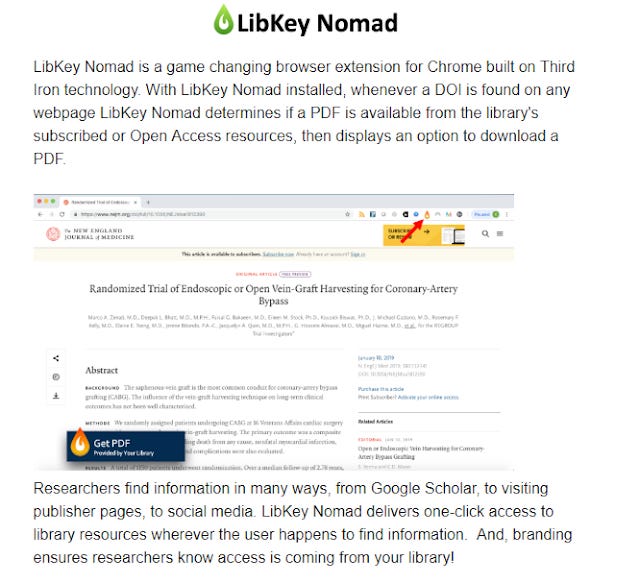
ThirdIron (browzine's) - Libkey Nomad announced in Feb 2019 - expected release Summer 2019
My understanding is that there might be other vendors and competitors that are considering entering the market in the coming months.....
What should we call this class of product/services?
It seems to me that we need a collective name to refer to this class or type of product/service but so far I have seen only one suggestion - "Access Brokers" tools/browser extensions.
The issue with using this term is that it was mooted in a RA21 statement "RA21 Position Statement on Access Brokers" and you don't have to read much between the lines in the statement to see that RA21 is unenthused to say the least of the idea behind this whole class of product/services.
From the statement I would interprete that RA21's stance is that such access brokers are more of band-aids/workarounds to solve a problem that won't be necessary if RA21's vision which is described as a "long-term, structural solution" comes to pass. This is something I might not agree with as browser extensions have function that go beyond what RA21 aims to do.
In particular, they warn about the possible user privacy issues that might result from installing browser extensions which by necessity have to scan each URL the user visits to see if it should trigger.
Still it is not unknown for a name that was initially coined by a competitor or even distractor to stick (see for example Fred Hoyle's coining of the term"Big Bang"), so unless someone has a better suggestion I'm going to stick to Access Broker browser extension to refer to them.
A brief history of Access Brokers browser extensions
I've blogged about the reasons why such browser extensions exist, but it is important to note that the idea of using browser extensions to help users discover and better access resources conveniently is not a recent one. In fact, more than a decade ago, the "Library 2.0" movement (or at least part of it) focused on this very idea.
The rallying call back then was to create tools and services that used web 2.0 technologies to help create value and interact with users. Part of it was leveraging social technologies that were just emerging like social networks, blogs as well as browser extensions that helped users better access library services. For instance there were greasemonkey scripts back then that would automatically check library catalogues for books when you were on Amazon pages.
Even though the idea of focusing on the workflow is all the rage now by Elsevier etc and wasn't quite a thing yet at the time, even then, we were talking about the need for us librarians to go where the users are and "be at the point of need" and library browser extensions were seen as a way to do it.
My blog itself first began just over a decade ago sharing ideas on using custom toolbars (anyone remember conduit toolbar?), bookmarklets, greasemonkey scripts, opensearch extensions to explore such ideas.
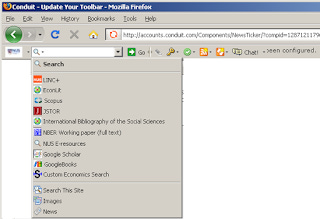
Conduit toolbar 'built' by me in 2009
But eventually the idea started to die as such custom toolbars became associated with Spyware and Adware and for a long time, Libx a free opensource toolbar developed and supported by Annette Bailey and Godmar Back was the only surviving flagbearer of the idea.
It was a favourite of mine at the time, as it had intergration with the library link resolver, auto hotlinking of issn/isbn/dois , useful right click context menu options (e.g. highlight a title and search in your discovery service, add the ezproxy) etc. I even had a version of Libx that could show a preview of Summon results from your instituion when you hovered over Dois etc!
I don't have any stats to prove this, but I suspect even at it's peak it was still something obscure loved more by librarians and some power users.
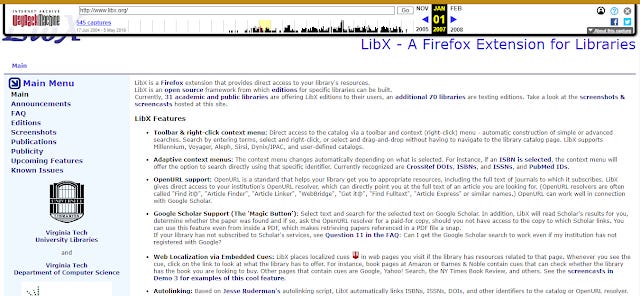
Libx website back in 2007 , more than a decade ago
So why did browser extensions make a comeback? I think part of it was around 2013 or so people started to realise discovery of the rising pool of open access or free to read articles was not as easy as it could be using conventional library services (aka anything not Google Scholar), and discovery services filling this gap started to appear and for whatever reason they found the most convenient way was in the form of browser extensions.
One of the first was Open Access Button which dates back to 2013.
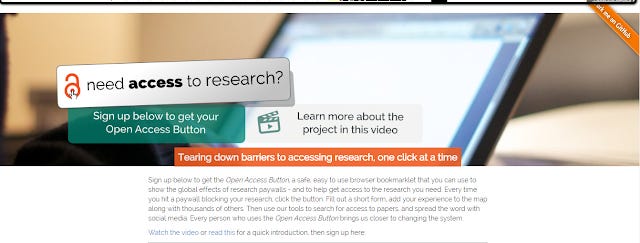
Open Access Button website as at 2013
Today Unpaywall is probably the most popular service for pointing to free to read articles. Besides the popularity of their browser extensions (currently 2nd only to Google Scholar button) their service (formerly called oadoi now renamed to Unpaywall) to link to free to read articles is used by almost every major discovery service from Scopus, Web of Science, Dimensions and now even Worldcat Discovery. Not to mention their service is intergrated into various link resolvers such as SFX, Alma Uresolver (planned), 360link , while countless other access broker browser extensions also rely on Unpaywall for detection of free to read articles.
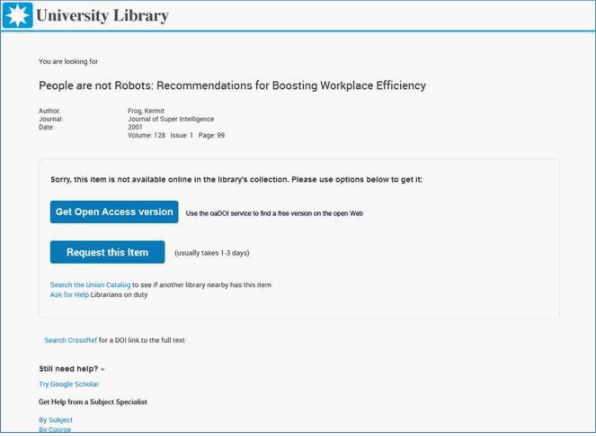
Early version showing intergration of Unpaywall (then called oadoi) in 360Link
Doing the obvious - Browser extensions start supporting finding institution subscription versions
At the time, as a librarian, I was bemused by the fact people who had institutional access would install things like Unpaywall which to me only solved half the problem. What about tools that also directed you to the institutional version? As a librarian from almost the beginning of my career, I was very cognizant on how access to institution versions was harder than it should be, whether it be off campus or because the version we had access to was available via an aggregator. and tools like Libx back then solved some of the problems.
But the obvious started to happen and browser extensions that helped with both free to read versions AND institutional copies.
One of the first was in fact the Lazy Scholar extension in 2014, which was a personal project by Colby Vorland and was done independently of any library or vendor. The earliest version that I reviewed back in 2014, cleverly ran a search in Google Scholar in another browser and scraped the library link resolver link from the page.
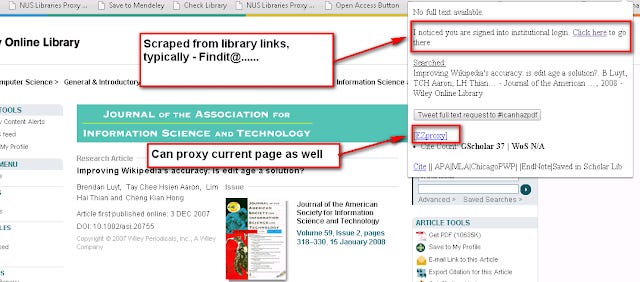
A very earlier version of Lazy Scholar in 2014
It was a idea that Google themselves ran with when they released their Google Scholar button in 2015 which still today is still by far the most popular extension in its class.
From a different direction, 2016 brought Utrecht University Library's UU Easy Access - a chrome extension which focused on automatically proxying domains that the users had access to. In a way it worked like a improved proxy bookmarklet (which required users to remember to use it), though eventually the creater of the extension Johan Tilstra spun it off to become Lean Library of today which is now quite a bit different from UU Easy Access.
For the rest of the post, I'm going to focus only on the commerical browser extensions referring to the free ones like Lazy Scholar, Google Scholar button, Unpaywall and Open Access Button only when necessary as a baseline.
Lean Library (Sage publishing)
Kopernio (Clarivate Analytics)
Anywhere Access (Digital Science)
Libkey Nomad , not released as of time of writing - 6th July 2019 (ThirdIron)
Do Library Link resolvers need an update?
A typical access broker browser extensions will scan every page the uses to detect if it is an article page (typically scanning metadata - doi would be easiest) and then check against a database of free to read articles (it's own and/or checking via APIs of other sources) or institutional holdings to check if it is available before redirecting the user.
While a few like Lean Library's browser extension utilize the Library Link resolvers to find institutional versions (and even they rely on services like Unpaywall to find the free to read versions), more like Kopernio, Anywhere Access and the upcoming Browzine Libkey Nomad use their own proprietary systems to redirect users.
They claim superior experience, touting "one click access to PDF" (rather than arriving on a landing page) and all you have to do is send them your holdings files (this isn't even necessary for Kopernio!) and the redirection will be done by them.
The drawback to not using your library link resolver (which Lean Library/Google Scholar button does) in the extension and relying on the access broker redirection service is that it is less transparent to the library what is going on and you lose control (i.e. you can't do much troubleshooting if a link is broken)
It's unclear to me what the fate of the library link resolver will be.
As pointed out to me, while we in the library world often talk about the fundamental flaws with openurl link resolvers, library link resolvers today use a blend of linking methods beyond just openurl.
Whatever methods these new redirection services such as Libkey/Kopernio use to improve user experience, there is no fundamental reason they can't be incorporated in our library link resolvers.
For instance there is no reason why our link resolvers can't redirect to free to read versions by leveraging services like Unpaywall and in fact many of our library link resolvers already do so.
Similarly I can't see why our link resolvers can't do one-click pdf downloads as opposed to sending users to the landing page either.
To be fair some solutions like Browzine's Libkey Link appear to work as supplements to your usual link resolver. For example in the case of Pubmed linkout local links, Libkey will get the "first bite" of the apple at finding the PDF and if it fails (Libkey doesnt support all platfoms particularly aggregators) it gets passed to the normal library link resolver.
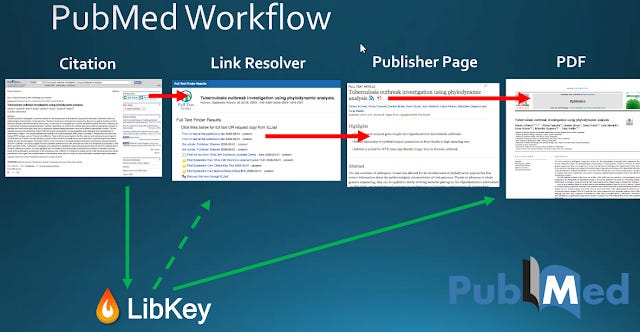
What should we be looking for in - "Access Brokers" browser extensions?
The obvious thing would be the recall and precision of such tools - which breaks down to the ability of the extension to properly recognise that user is on a page with article information (parsing of information on webpage) and the size and accuracy of the database (both for free to read and institutonal holdings).
I am not aware of that many tests of the ability to find free to read full text much less one that compares the ability to detect institutional copies. Still it might be good to check how good they are at finding institutional copies on aggregator (e.g. Proquest, Ebsco) sites, since these tend to be not supported.
Beyond the basic features to help users find full text, it's still unclear what other value added services the browser extension can provide.
One fairly common feature the current crop of extensions have is that they try to be helpful by storing pdfs found via the extension in a "library" (etc Kopernio). As a user it's unclear to me how useful this feature would be, but it looks to me to a play to become "sticky" in a user workflow very similar to the same function in a reference manager.
Other features I have seen includes offering of ILL/DDS functins (Lean library), access to PDA pool of resources (Anywhere Access + Readcube), knowledge base error reporting (Anywhere Access) helpful messages on specific domains specified by librarians (Lean Library), usage statistics (everyone).
Most of these tools started focused on journal articles, but an interesting idea might be moving towards detection of books (both print and ebooks). Many of the older Library 2.0 style tools (and some extensions today that target Public Libraries) would try to detect books on Amazon and similar pages and try to check against the catalogue for holdings etc.
I think we have just scratched the surface of what is possible that might be useful to researchers, just take a look at Lazy Scholar and you can see amazing set of features (possible because of scholarly API ) like
Recommendations
Saved search history
Automatically extracts authors email (so you can email them if needed)
Pulls in journal and article level metrics including altmetrics and any user comments
Extraction of references etc
But of course one must be careful not to bloat up the extension.
The last feature that of course that must be looked at is user privacy and security. Browser extensions have a very high level of access to user behavior (which was why malware/adware in the early 2000s were often in the form of browser toolbar extension) and can be abused.
Of course, while user statistics can be very useful to the librarian, there is a trade off between that and protecting user privacy.
For example, in a earlier blog post, I had blogged about the current issue of COUNTER Release 5 - implementing Distributed User logging which allows tracking of users even when they download versions of papers not from the main publisher platform.
Should Access Broker browser extensions like Kopernio or Anywhere Access track users and contribute those statistics (particularly to downloads of versions of papers not on the publisher platform) to be aggregated with the usual COUNTER downloads from the publisher platform?
What follows will be my totally subjective impressions on the main alternatives.
Lean Library
Johan Tilstra, founder of Lean Library, started off working at Utrecht University Library on UU Easy Access browser extension before starting Lean Library. It was then acquired by Sage in 2018.
Because of his background, Lean Library browser extension strikes me as something that is designed to be useful for not just researchers but is also sensitive to the needs of librarians.
Unlike Kopernio, there is no freemium version of this, but Lean library has been pretty successful at courting librarians onboard to implement this at an institution level achieving some high profile wins such as Stanford and Havard.
Lean Library currently boasts three modules.
Library Access - This was the original function in the UU Easy Access. Working as an improved proxy bookmarklet, it automatically recognises if a domain the user on can be proxied (typically based on getting read access to your ezproxy config file) and it will then suggest the user do so.
Library Alternatives - While proxying by domain can be useful in certain cases (example databases like Scopus, Web of Science), they don't quite solve the problem of access to full text of articles since institutions may not always have access to all the articles on a domain say JSTOR or Wiley. The "Library alternative" module implements the familar article level detection technology you see in others like Kopernio - allows the extension to redirect the user to institutional versions (via Library Link resolver), free to read copies (from various sources such as Unpaywall) and as a last resort to the institution's ILL/DDS form
Library Assist - This is a function that is unique to Lean Library and perhaps most clearly shows the business strategy of Lean library to be geared to be helpful for librarians as well as researchers. This function allows librarians to setup messages that will automatically appear when the user is on a certain domain.
The librarian in me sees so many possibilities with this. Off the top of my head, you could have targetted messages appear on databases that are up for renewal, on trial or send messages to sites currently under maintaince etc. How about running surveys like LIBQUAL+'s MINES (Measuring the Impact of Networked Electronic Services) for libraries?
I guess this is why I see on twitter mentions that Lean Library presentations at conferences often described as "standing room only".
Kopernio
Kopernio was founded by Jan Reichelt and Ben Kaube, the co-founders of Mendeley and Newsflow and as such has drawn comparisons to Mendeley.
Like Mendeley, Kopernio appears to be more oriented toward researchers and offers a free version to build up a user base and this together with it's ability to gain publicity on widely read publications (second only maybe to Unpaywall) like Nature, Scientific American, Guardian , means that installs has surged to 160k from 4k. It is now in 3rd place in number of installs just behind Unpaywall.
The typical playbook after building up a user base would be to start charging for a premium service (more space for storing articles say) but as at time of writing (May 2019), Kopernio still does not offer a paid individual or institutional premium version, though its acquisition by Clarivate might have given Kopernio resources such that this move isn't necessary at this time.
It's interesting to compare Kopernio's acquisition by Clarivate against Lean Library's acquisition by Sage.
Kopernio is now prominently displayed and intergrated on Clarivate products such as the flagship Web of Science platform and in marketing emails.
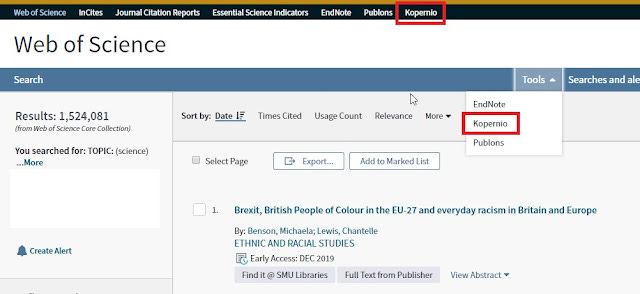
Kopernio being linked from Web of Science Platform
I would guess Kopernio together with Publons is going to play quite a prominent role in Clarivate's strategy? Kopernio now offers a "locker" feature that stores PDFs downloaded via Kopernio , it will be interesting to see what other features are added. Perhaps, intergration with JCR? Metrics from Web of Science/Publons/Incites?
In comparison, so far Sage's acquisition of Lean Library seems to be so far low key. It would be easy to miss the acquisition as does not seem to be any move to intergrate Lean Library with Sage yet (at least I don't see them in Sage Knowledge or Sage Research method platforms) thought to be fair Sage's acquisition of Lean Library is still fresh.
In terms of technology, because there is no institutional version of Kopernio out there, its hard to really get a sense of how Kopernio works, though from what people are saying it logs-in on the user's behalf and tries to see if there is a PDF and if so downloads it.
Perhaps I'm to used to library centric products and used to spending time figuring out ways to push institutional holdings to various products so it will work so it seems amazing that Kopernio is the only service I'm aware of (both Anywhere Access and Lean Library require you to give them access to holdings and presumably Libkey Nomad will use Browzine holdings) that can redirect users to subscription versions without the institution submitting holdings files.
Anywhere Access
I probably have the least knowledge of Anywhere Access despite a demo by Digital Science and attending a webinar, so take my description with a pinch of salt.
Dimensions (which looks to be fast becoming accepted as a major citation index next to Google Scholar, Scopus, Web of Science and Microsoft Academic) comes without the typical library link resolver function that you might expect to direct users to institutional copies.
Instead Digital Sciences offers a new service called Anywhere Access that can be used in Dimensions (as well as Pubmed, Google Scholar), which looks to me acts like almost an alternative to the usual library link revolver thought that term is never used.
Of course, it's a no brainer to include a browser extensions as well.
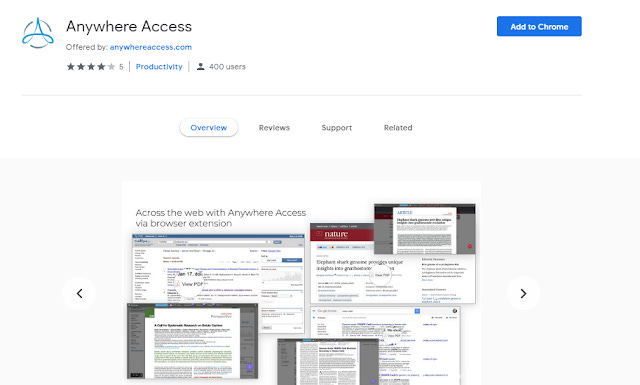
As the new kid on the block, the number of installs of the chrome extension are low at 400 installs. But that's to be expected since like Lean Library and unlike Kopernio there is no free version.
One of the more interesting points of Anywhere Access is I believe that it intergrates with Readcube with allows institution to incorporate Readcube/Papers app, which I see as Digital Science's answer to Mendeley.
Perhaps another platform workflow play?
Libkey Nomad
Third Iron's Browzine unifies the experience of accessing journals on mobile devices by offering a standard journal browsing interface on mobile and allowing simple one tap downloads of PDFs.
I think it is fair to say that Browzine had achieved great success and pretty much conquered the academic and medical institution market in this area with thousands of institutions subscribing.
Given it has solved the problem of sending users to the PDF directly a technology dubbed Libkey, it seems a matter of time they would start exploiting it.
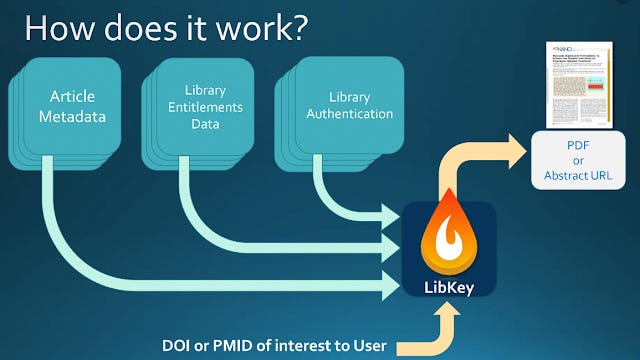
As such Third Iron has announced there will be offering 2 main lines of services.
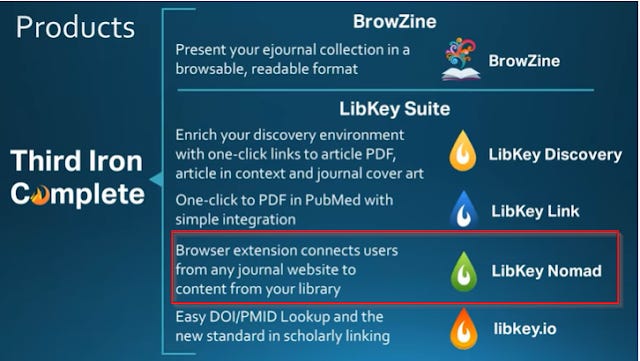
From Browzine Webinar
Firstly there is the usual Browzine package. Then there is a new set of services called "Libkey Suite". You can of course have both "Third Iron complete".
Let talk about Libkey modules.
One of the earliest applications (I think might have predated Libkey terminology) was to encourage libraries to embed Libkey links into Discovery services like Summon, Primo, EDS. While this seems to be redundant , Browzine argues their Libkey allows direct downloads of PDFs which are often not offered by the native link resolver links on the discovery service. This is now dubbed "Libkey Discovery".
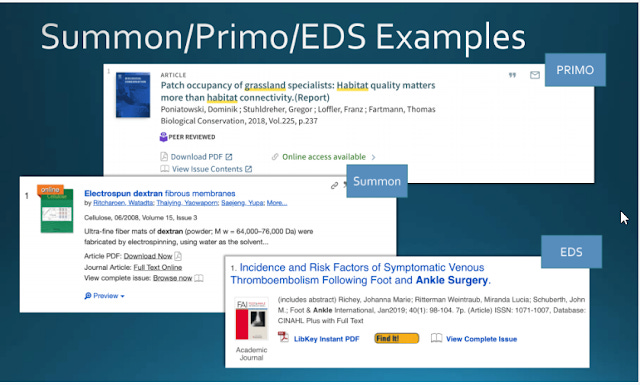
This also has the side effect of boosting Browzine usage of course.
They also introduced Libkey Link, which proposes to replace the Pubmed Linkout link with Libkey's link rather than the usual library link resolver.
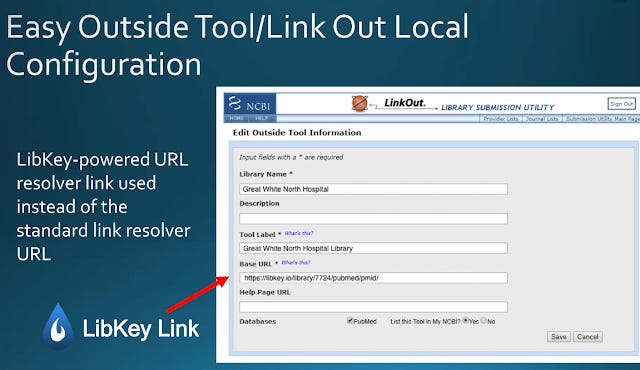
Essentially when the user clicks on the Pubmed Linkout link, it will first go to Libkey which will get the first bite of the apple to try to send the user directly to a PDF. If it fails , it will pass it on to your usual link resolver.
This seems typical of Libkey idea, working as a supplement to the usual Library Link resolver you have
There's also Libkey Nomad - a browser extension but this isn't launched yet and Libkey,io which was compared to Sci-hub where you can just enter a doi to get the pdf....
It seems if you are already an existing customers of Browzine you automatically get both Browzine and the Libkey suite.
More specifically, If you subscribed to Browzine on or before December 31, 2018, your subscription will be grandfathered into the Third Iron Complete Subscription at no additional cost This means until the contract runs out you will have access to Browzine and the Libkey suite.
So for example if you happen to have already signed for 3 years of Browzine, you also get the Libkey suite for that period. For new customers they will be sold seperately.
Of all the other services listed here, ThirdIron seems to be most obvious and directed in their aim as a enabler to enhance seamless workflow (supplementing existing Link resolver technology).
Still I wonder, what if the current library link resolver vendors also start to incorporate similar tech?
Final thoughts
Are access broker extensions a fad? Currently it seems that the market is getting crowed with them (possibly because the technical barrier isn't that high?) but will this continue?
RA21 would have you believe that if they achieve their goals both Access browser extensions and proxy systems would become obselete. Even if true (and I'm not sure it is), how long will that take?
Of course part of me thinks that if high levels of Open Access are achived rapidly the same would apply for a lot of the use of RA21, Proxy systems and Access Brokers!
But let's not speculate so far and assume a time horizon of 5 years. It seems to me the main obstacle facing these tools is the same one that led to the decline of library 2.0 tools a decade ago.
How likely are users to install and use these tools? Some earlier adopter institutions of such services will have been promiting and using them for almost 2 years. Are users adopting the tools?
Or are the tools still very much a niche thing?
As someone who had prior experience promoting such tools (admittedly the technologically inferior proxy bookmarklet), I have seen some limited success at my former institution and have presented my findings before.
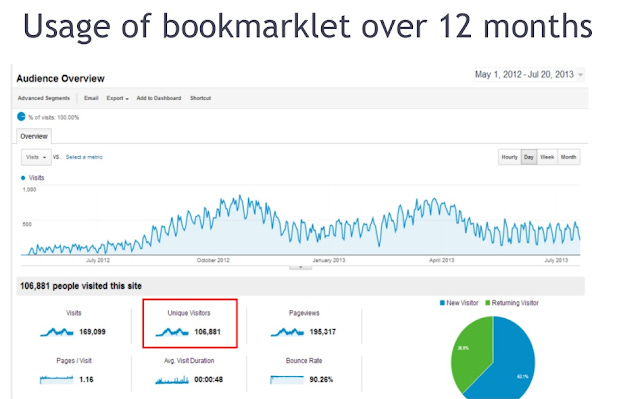
Usage of Proxy Bookmarklet at my former institution (presentation at IFLA)
As a librarian thinking of implementing these tools, besides the technical bits, I would probably think about the promotion avenues, how can we ensure that as many users as possible are aware and have installed them? Can we tie up with our Computer centre to get them installed during onboarding process (with user permission of course)?
What would be a realistic adoption rate to expect?
Still I suspect such tools can really make a difference in the lives of our users. I remember learning with amazement that senior students were raving about the very much primative proxy bookmarklet at my former institution and recommending them heartily to their juniors. .
On that note, if you haven't installed the #NUS Library bookmarklet, please do: http://t.co/vCzm3KrQPH…. So darn useful!!! @NUSLibraries
— ridgefolks (@ridgefolks) August 21, 2013
The NUS proxy bookmarklet is probably the most useful tool but also the most underused lmao (cc: @NUSLibraries) @aditiiiiii @samandgas
— Kwan Jin Yao (@guanyinmiao) March 31, 2016
AWESOME!!! -RT @NUSlibraries Doing your assignments with Google Scholar? Use the proxy bookmarklet to access full text http://bit.ly/9q0oR1
— Samuel Chee (@sc_oops) October 18, 2010
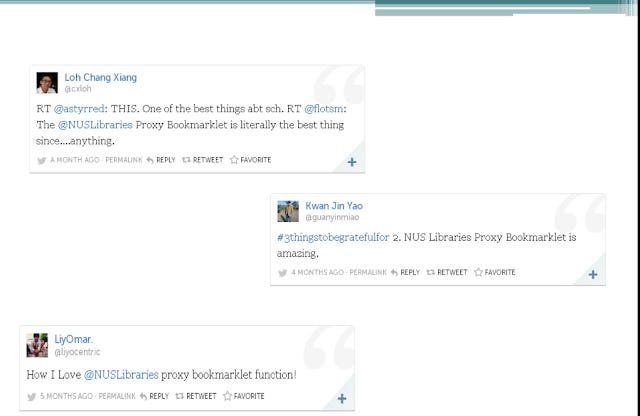
Given that Kopernio, Lean library etc are far more developed versions of proxy bookmarklet, I suspect we can achieve even more.
Additional details
Description
It has been over a year in April 2018 since I had the opportunity to present at two panels in conferences alongside experts such as Lisa Hinchliffe, Johan Tilstra (Founder Lean Library), Jason Priem (Cofounder Unpaywall), Ben Kaube (Cofounder Kopernio
Identifiers
- UUID
- 83d8cb92-925e-460c-9811-f5bef80c6b5b
- GUID
- 164998304
- URL
- https://aarontay.substack.com/p/kopernio-lean-library-anywhere-access
Dates
- Issued
-
2019-05-12T16:30:00
- Updated
-
2019-05-12T16:30:00

